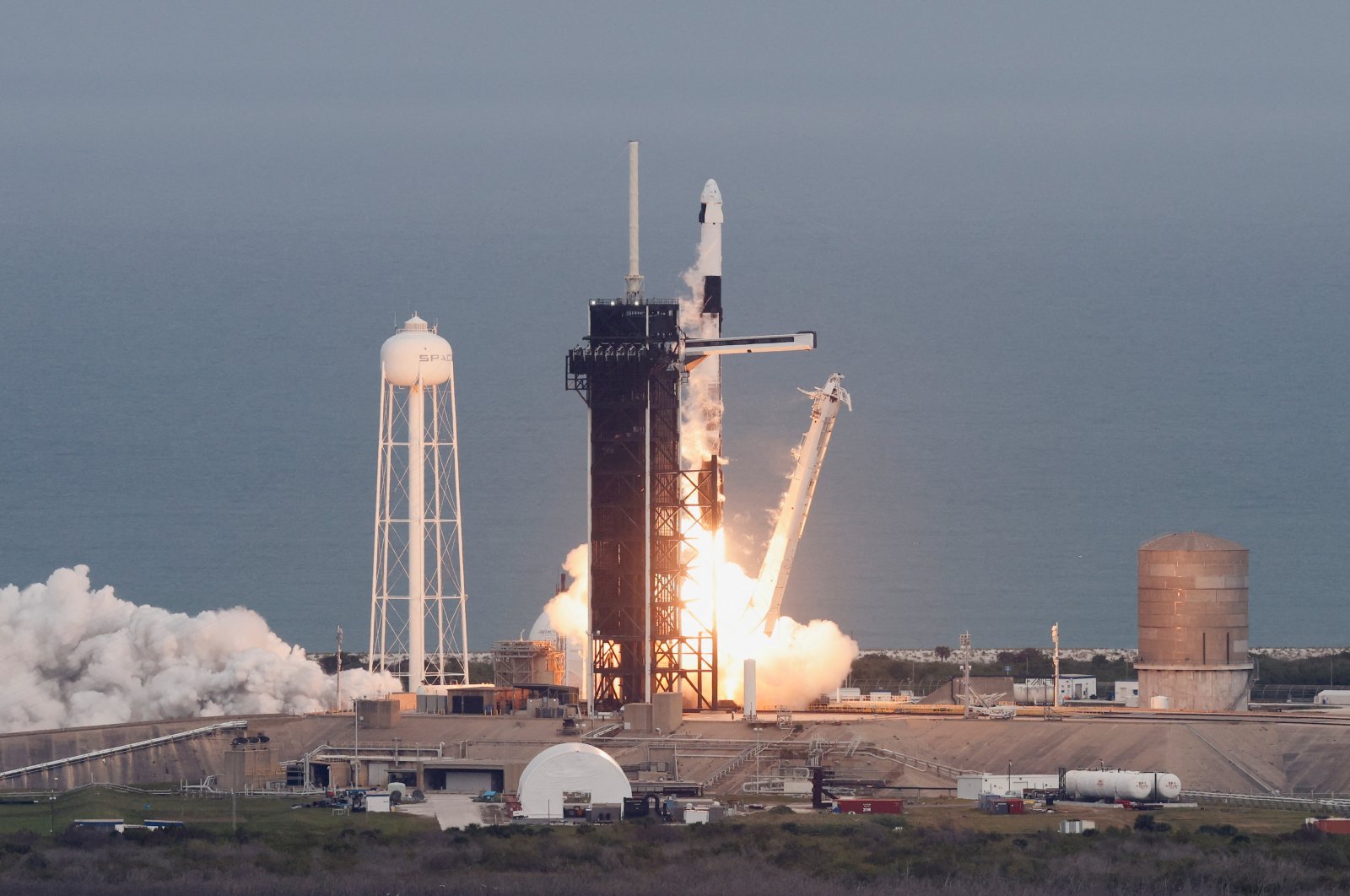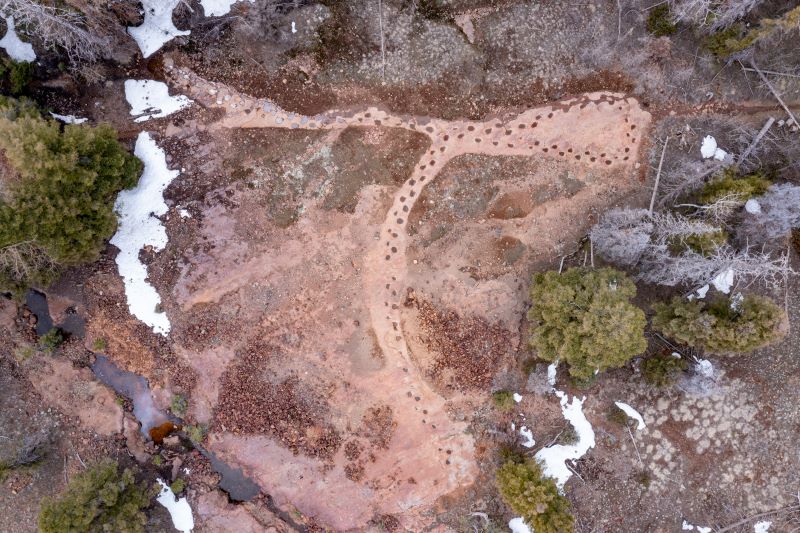A crew with Türkiye’s first astronaut and three other members blasted off on Thursday on a voyage to the International Space Station (ISS), in what President Recep Tayyip Erdoğan said marked a “historic” moment for the country.
A SpaceX Crew Dragon capsule fixed to the top of a Falcon 9 rocket carrying the Axiom-3 mission quartet lifted off about an hour before sunset from NASA’s Kennedy Space Center in Cape Canaveral, beginning a planned 36-hour flight to the orbiting laboratory.
Alper Gezeravcı, the first person from Türkiye to rocket into space, is accompanied by a Swede and an Italian, all with military pilot experience and representing their homelands. Their escort on the trip: A retired NASA astronaut who now works for Texas startup Axiom Space, the company that arranged the private flight.
Their capsule should reach the space station early on Saturday. They will spend two weeks performing experiments, chatting to schoolchildren and soaking in the views of Earth before returning home.
“The future is in the skies,” said Gezeravcı in his first remarks as astronauts checked in from orbit, reciting the words of Mustafa Kemal Atatürk, the founder of the Republic of Türkiye.
“Starting from the end of the countdown all the way to here – a great ride. It has been a great feeling, as I have been dreaming of for so long … So it’s been great so far,” he noted.
“I’m so privileged and honored to be a part of this great team. Thank you so much, everybody, who has worked tremendously up until now for us to make it to this moment.”
A former fighter pilot and captain for Turkish Airlines, Gezeravcı noted Türkiye just celebrated its 100th anniversary and, until now, the nation’s view of the sky has been limited to “that we could see with our bare eyes.”
“Now, this mission is opening that curtain all the way,” he told reporters before the flight. “This is the beginning of our next centennial.”
Erdoğan has displayed a keen interest in the mission, having presented Gezeravcı, 44, to the Turkish public last year.
“We are taking a step into the second century of our republic, the Century of Türkiye, with the manned space mission we have undertaken for the first time,” Erdoğan said in a video message on Thursday.
The president said as heirs of a civilization that has made significant contributions to the history of science, they are marking the start of a valuable new chapter, aiming to reenact the mission carried throughout history.
“For the first time, we are sending a citizen into space to inspire our young people who look to the horizon with a sparkle in their eyes and our children whose dreams cannot be contained within the world,” Erdoğan said.
The mission has been one of the goals of Türkiye’s National Space Program, which was announced in early 2021.
Also flying: Sweden’s Marcus Wandt, a former fighter pilot and test pilot for Swedish Aeroplane Corp. who was chosen in 2022 as a reserve astronaut by the European Space Agency, and Italian Air Force Col. Walter Villadei, who flew to the edge of space last summer with Virgin Galactic.
Among the symbolic items they are taking up are a Nobel Prize medal from Sweden, fusilli pasta from Italy, and tokens of Türkiye’s nomadic culture.
Michael Lopez-Alegria launched four times as a NASA astronaut before joining Axiom Space and escorting its first chartered flight with them. He is the only repeat passenger on a SpaceX Dragon, the capsule that’s been used to ferry astronauts to the space station for NASA since 2020.
Reflecting on the unique privilege of space travel, Lopez-Alegria said it was “a real privilege for anybody to fly in space.”
“It’s particularly nice for me as a second time on Dragon. The sensations were equally amazing – acceleration, a little vibration, just a sense of going fast. And wow, what a thrill!” he added.
Villadei also expressed his excitement.
“It’s a privilege to be here, to fly over the Earth waiting to get into the ISS.”
Representing his country Sweden and Europe, Wandt said: “I didn’t really expect that sensation of acceleration and speed. There was fantastic, pure joy.”
“Getting up here and then feeling the microgravity is really weird. It’s also awesome. Just floating around and repositioning yourself wherever you’re doing,” he added.
The autonomously operated Crew Dragon is expected to reach the ISS on Saturday and dock with the outpost orbiting some 400 kilometers (250 miles) above Earth, which is currently occupied by seven regular crew members.
Live video streamed online by Axiom showed the two-stage, 25-story-tall launch vehicle streaking into partly cloudy skies over Florida’s Atlantic coast atop a fiery, yellowish tail of exhaust.
Cameras inside the crew compartment beamed footage of the four men strapped into their pressurized cabin, seated calmly in helmeted white-and-black flight suits as the rocket soared toward space.
Nine minutes after launch, the Falcon 9’s upper stage delivered the crew capsule to its preliminary orbit.
Responding to congratulations from mission control, flight commander Lopez-Alegría radioed back from the Crew Dragon, “As I was saying, it’s a team sport. Thank you, guys.”
Minutes earlier, the rocket’s reusable lower stage, having detached from the rest of the spacecraft, flew back to Earth and safely touched down on a landing zone near the launch site, eliciting cheers audible from the control room.
The trip is the third journey organized by Axiom Space with NASA and SpaceX over the past two years. The company charges its customers at least $55 million for each astronaut seat.
The mission marks “a milestone for the work we are doing in the Space Homeland and will carry out in the future,” Türkiye’s Presidential Communications Director Fahrettin Altun said.
Altun said it marks a realization of a dream that has been anticipated for years.
“Türkiye is witnessing a historic moment,” he wrote on X, formerly known as Twitter.
Industry and Technology Minister Mehmet Fatih Kacır said Col. Gezeravcı’s journey would leave a lasting and positive mark on society in Türkiye.
“Not only Alper’s dreams but also the dreams of Turkish children and youth will exceed the limits of the sky,” Kacır told Anadolu Agency (AA) hours before the launch.
Liftoff was initially planned for Jan. 9 but was postponed twice to Jan. 17 and then to Jan. 18, among others, to allow more time for final inspections and data analysis, including an issue related to the parachute system used to slow the capsule’s return descent before splashdown, the company said.
Two weeks of orbital research
Plans for the Axiom-3 mission call for the crew to spend roughly 14 days in microgravity aboard the ISS, conducting more than 30 scientific experiments, many of them focused on the effects of spaceflight on human health and disease.
More symbolically, the mission reflects the growing number of nations venturing into Earth’s orbit to enhance global prestige, military prowess, and satellite-based communications.
Türkiye, a longtime applicant for EU membership, was poised to enter the exclusive but expanding club of ISS-guest countries by sending Gezeravcı on his nation’s debut human spaceflight as an Ax-3 mission specialist.
Axiom billed the flight as “the first all-European commercial astronaut mission” to the space station.
If all goes smoothly, they will be welcomed aboard ISS by the seven members of the station’s current regular crew – two Americans from NASA, one astronaut each from Japan and Denmark and three Russian cosmonauts.
In May 2023, Axiom-2 launched a team of two Americans and two Saudis, including Rayyanah Barnawi, a biomedical scientist who became the first Arab woman ever sent to orbit on an eight-day mission to the ISS.
SpaceX, the privately funded rocket and satellite company of billionaire Elon Musk, provides Axiom’s launch vehicles and crew capsules under contract, as it has for NASA missions to the ISS. SpaceX also runs mission control for its rocket launches from the company’s headquarters near Los Angeles.
Besides furnishing the launch site at Cape Canaveral, NASA assumes responsibility for the astronauts once they rendezvous with the space station.
Axiom, an eight-year-old venture headed by NASA’s former ISS program manager, is one of a handful of companies building a commercial space station of its own intended to eventually replace the ISS, which NASA expects to retire around 2030.
Launched to orbit in 1998, the ISS has been continuously occupied since 2000 under a U.S.-Russian-led partnership that includes Canada, Japan and 11 countries that belong to the European Space Agency.
Yusuf Kıraç, the president of the Turkish Space Agency (TUA), said Türkiye had been waiting for this for many years.
“Alper will hopefully successfully complete 13 scientific studies to pave the way for our country’s future endeavors,” Kıraç said.
“Today is a milestone for us, but it will continue. Our moon program, sending our people with our launch systems, is our main goal.”
Hasan Mandal, head of the Scientific and Technological Research Council of Türkiye (TÜBITAK), also called it a historic day.
“We are realizing one of the missions that will leave a mark on history in the Century of Türkiye,” said Mandal.

Dr. Sarah Adams is a scientist and science communicator who makes complex topics accessible to all. Her articles explore breakthroughs in various scientific disciplines, from space exploration to cutting-edge research.







